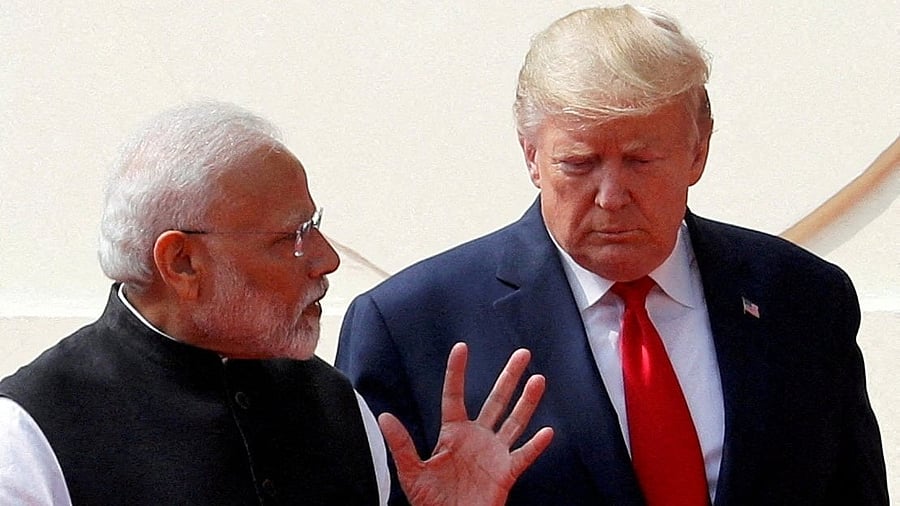
US President Donald Trump and India's Prime Minister Narendra Modi
Reuters File Photo
New Delhi: India has never accepted and will never accept mediation by any third party to settle issues with Pakistan, Prime Minister Narendra Modi on Wednesday told United States President Donald J Trump, who, however, did not relent and, later in the day, repeated his claim about brokering a ceasefire between the two neighbours last month.
Modi had a phone call with Trump and dismissed his claim that he had used the threat of suspending US trade with India and Pakistan to make the two South Asian nations agree to halt the four-day-long military offensive against each other last month.
With the Trump Administration hosting Pakistan Army chief, Field Marshal Asim Munir, whom New Delhi had accused of provoking the April 22 terrorist attack in Jammu and Kashmir with an incendiary speech, the prime minister also turned down an invitation from the US president for a stopover in Washington, DC, while returning from Canada. Modi rather stuck to his itinerary and flew from Calgary, Canada, to Zagreb, the capital of Croatia, shortly after the phone call with Trump.
The prime minister and the US president were expected to hold a bilateral meeting on the sidelines of the G7 summit at Kananaskis, Alberta, in Canada. But, with the Iran–Israel conflict escalating, the US president returned to Washington, DC, much earlier than scheduled, and even before the prime minister could land in Calgary on Tuesday. The two leaders, however, spoke over the phone for almost 35 minutes early on Wednesday.
The prime minister firmly conveyed to the US president that India did not and would never accept mediation by any third party to resolve any issue with Pakistan. “There is complete political consensus in India on this matter,” Foreign Secretary Vikram Misri said after the phone call between the two leaders.
“I think Modi is a fantastic man. I spoke to him last night. We're going to make a trade deal with Modi of India. But I stopped the war between Pakistan and India,” Trump said in Washington, DC, later in the day. He even lauded Munir, noting that the Pakistan Army chief had been “extremely influential” in stopping the hostilities from his side. “Modi, from the Indian side, and others. They were going at it, and they're both nuclear countries. I got it stopped.”
During his phone call with Trump earlier, Modi dismissed the US president’s repeated claims about using the threat of stopping trade with India and Pakistan to make the two South Asian neighbours halt the cross-border military offensives.
Modi told Trump in clear terms that India had conveyed to the whole world its resolve to respond after the killing of 26 people, mostly tourists, at Baisaran near Pahalgam in Jammu and Kashmir (J&K) by a gang of Pakistani and Pakistan-trained terrorists on April 22. India had only targeted the terrorist camps in Pakistan and areas under the illegal occupation of Pakistan in “measured, precise and non-escalatory” strikes, Misri said, quoting from what Modi told Trump. The prime minister received a call from US Vice President J D Vance on May 9, warning that Pakistan might launch a major attack on India. Modi told Vance that India would retaliate with an even stronger response to Pakistan, Misri said, quoting from the prime minister’s phone conversation with Trump.
After India, on the night of May 9–10, gave a strong and decisive response to Pakistan’s attack, inflicting significant damage on the military of the neighbouring country, where military airbases were rendered inoperable, India’s firm action compelled Pakistan to request a cessation of military operations. At no point during this entire sequence of events did any official of the Trump Administration discuss the India–US trade deal or any proposal for mediation by the US between India and Pakistan. The discussion to cease military action took place directly between India and Pakistan through the existing channels of communication between the armed forces of the two nations, said the foreign secretary.
Modi told Trump that India no longer viewed terrorism as a proxy war, but as a war itself.
Trump’s repeated claims about brokering a ceasefire between India and Pakistan emerged as an irritant in New Delhi’s ties with Washington, DC.
New Delhi maintains that the 1972 Simla Agreement between India and Pakistan and the 1999 Lahore Declaration had left no scope for the UN or any other third party to play any role in resolving the “outstanding issues” between the two South Asian neighbours.
